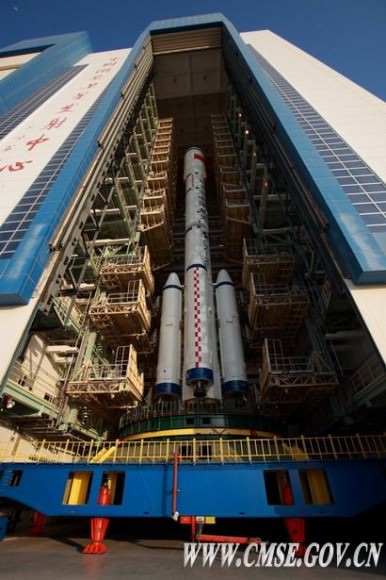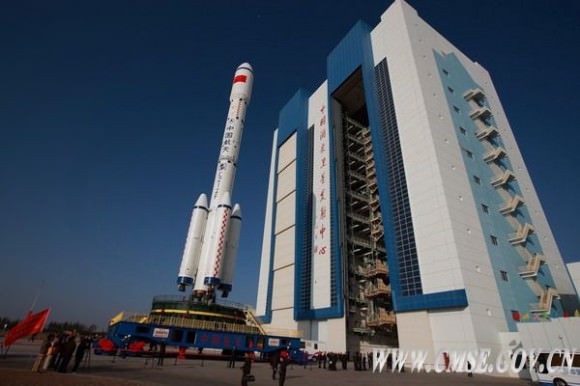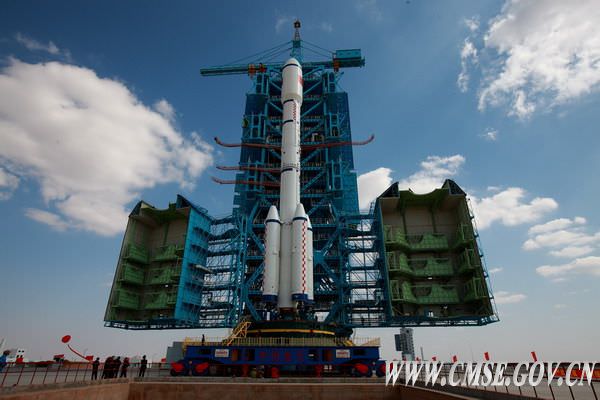[/caption]
China’s human spaceflight program is gearing up to take a highly significant “Leap forward in Space” after their “Tiangong 1” prototype space station was rolled out to the remote Gobi desert launch pad at the countries Jiuquan Satellite Launching Center in Gansu Province in anticipation of blastoff sometime this week.
Space officials from the Chinese Manned Space Engineering Office have now confirmed that liftoff of the 8.5 ton Tiangong 1 human rated module atop a Long March CZ-IIF booster rocket is slated to take place during a launch window that extends from Sept. 27 to Sept. 30. The launch was delayed a few days after the recent launch failure of a similar Chinese rocket, the Long March IIC.
China’s burgeoning space efforts come directly on the heels of the voluntary US shutdown of the Space Shuttle program, thereby dismantling all US capability to launch humans into space from American soil for several years until about 2014 at a minimum.
The US manned spaceflight capability gap will be stretched out even further if NASA’s budget for commercial space taxis and the newly proposed SLS launch system is cut by political leaders in Washington, DC.

On Sept. 20, the integrated Long March rocket and Tiangong module were wheeled out of China’s VAB while sitting on top of the Mobile Launch Platform and transferred to the launch gantry at Jiuguan.
The goal of the Tiangong 1 mission is to carry out China’s first human spaceflight related rendezvous and docking mission and to demonstrate that Chinese space engineers have mastered the complicated technology required for a successful outcome.
These skills are akin in complexity to NASA’s Gemini manned program of the 1960’s which paved the way for NASA’s Apollo missions and led directly to the first manned landing on the moon in 1969 by Apollo 11.
Chinas stated goal is to construct a 60 ton Skylab sized space station in earth orbit by 2020.
Check out this CCTV video for further details and imagery of the Chinese space hardware which shows the how China will expand the reach and influence of their space program.
View this Chinese video from NDTV for a glimpse at Chinas long range Space Station plans.
The 40 foot long Tiangong 1 space platform is unmanned and will serve as the docking target for China’s manned Shenzhou capsules in a series of stepping stone learning flights. It is solar powered and equipped to operate in a man-tended mode for short duration missions and in an unmanned mode over the long term.
The initial rendezvous and docking mission will be conducted by the Shenzhou 8 spacecraft, which will fly in an unmanned configuration for the first docking test. Shenzhou 8 is scheduled to soar to space before the end of 2011.
If successful, China plans to quickly follow up with the launch of two manned Shenzhou flights to dock at Tiangong 1 during 2012 – namely Shenzhou 9 & Shenzhou 10.
The multi astronaut chinese crews would float into Tiangong 1 and remain on board for a short duration period of a few days or weeks. The crew would conduct medical, space science and technology tests and experiments.
China’s first female astronaut may be selected to fly as a crew member on one of the two Shenzhou flights in 2012.
Meanwhile, all American astronauts will be completely dependent on the Russian Soyuz capsule for trips to the International Space Station. Russia is still working to correct the third stage malfunction which doomed the recent Progress cargo resupply launch and put a halt to Soyuz launches.
Engineers and technicians are in the process of checking out all Tiangong 1 systems and preliminary weather reports from Chinese media appear favorable for launch.
Shenzhou 8 has also been delivered to the Jinquan launch complex for check out of all systems
Get set for China’s attempt at a ‘Space Spectacular’



It’s sad and really troubling that the USA is no longer capable of sending humans into space. We are spending obscene amounts of money to kill people in the middle east but we can’t find the money to continue a very worthwhile space program. Leave it to the politicians!
Have you noticed how much China’s military is growing, lately? Merely because they’re not in active combat with someone doesn’t mean they aren’t doing much the same thing.
And unlike NASA, their manned space projects are *part* of their defense agency.
And these days, NASA’s problems isn’t so much about the size of their budget, as it is HOW it’s spent ..or how Congress is requiring them to spend it (*cough*SLS*cough).
Throwing more money at bad policy would still be bad policy.
Besides, we were aware of a coming ‘gap’ in manned space access since 2004. No one has a right to be surprised.
Let’s not start fear-mongering about China’s military. The US military budget is greater than every other nation COMBINED, but yet we argue about cutting funding for the JWST.
We deserve to fall behind in the space race.
This is not about policy. I’m making the observation that spending a significant part of one’s GNP on the military, is not necessarily inconsistent with a robust government space program. The US went to the Moon, at the height of involvement in Vietnam. (and was doing so as quickly as possible…more money would not have changed that) This may not be a good thing, but it’s a true thing.
I leave the question of what China may or may not *do* with its clearly increasing capability, to another time and place.
And JWST was mismanaged. More money would not, by itself, fix that,either.
Also, getting away from the now-obsolete ‘space race’ mentality (which does not automatically mean the converse of large, inefficient international projects, either) is part of what really need now.
We (meaning the US, but I extend this advice to all other current and future spacefaring nations)) should do what seems the most rational, cost effective way to progress in space exploration and development, regardless of someone else’s plan or schedule…
There was a policy put forward that space would be left unmilitarized by any nation. The ONLY country that wouldn’t/ didn’t sign the agreement was the United States.
So your comments about China are outrageous.
Do everybody a favour and keep your comments about science/education.
“There was a policy put forward that space would be left unmilitarized by any nation. The ONLY country that wouldn’t/ didn’t sign the agreement was the United States.”
Can you name this unratified agreement, please?
This is what the US and other signatories are bound by:
http://www.unoosa.org/oosa/SpaceLaw/outerspt.html
It refers to placing nuclear and other weapons of mass destruction in space, not a vague, unenforcable assertion of ‘militarizing’ space. There are many military assets of many nations that are not ‘weapons.’ of any kind, primarily communications, reconnaissance, and navigation. (most especially GPS) And I do not begrudge China or anyone else any of *those* functions.
If you refer to the so-called ‘Moon Treaty,’ it only refers to military use of ‘celestial bodies,’ not all of ‘space.’..
http://en.wikipedia.org/wiki/Moon_Treaty
…But the objections are mostly in regard to the ownership use of extraterestrial resources. There are only 13 signatories, and that’s a far cry from “The ONLY country that wouldn’t/ didn’t sign the agreement was the United States.” And there’s no real value to a military facility on, say, the Moon anyway. I’ve no problem with not doing that.
So, what are you talking about?
“Do everybody a favour and keep your comments about science/education.”
Oh, please. It was not I who brought up the military issue. You will have to address that to Nick and Baris. I explicitly said I would not discuss what China would *do* with its increasing military capability here, and I still will not.
Speculate all you wish on what we *could* be doing in space with military expenditures (or lipstick or pro sports), but it’s an irrelevant waste of time. Government space projects still must rise and fall on their own merits, no matter what else said government is doing…
…And never allow yourself to forget that there’s a large subset of people who view space-related expenditures as something on which *they* would rather see the money spent elsewhere.
Sorry for being vague, I knew I’d read it somewhere, just couldn’t remember the details off the top of my head. See below….
“The goals of militarisation of space are far reaching. The space Commands Clinton-era brochure Vision for 2020 announced the primary goal prominently on the front cover: ‘dominating the space dimension of military operations to protect the US interests and investment’…….
[skip some lines for brevity]………..
The next logical step is space forces to protect ‘US interests(military and commercial) and investments, including missile defence, as well as ‘space based strike weapons’, enabling ‘the application of precision force from, to, and through space’………
[skip some paragraphs for brevity]…
the US has refused to join the rest of the world in reaffirming and strengthening the Outer Space Treaty of 1967 to reserve space for peaceful purposes………..
[skip some paragraphs for brevity]…….
the Bush administration effectively vetoed yet another international effort to prevent the militarisation of space.
[skip some paragraphs for brevity]…….
‘Washington blocked negotiations at the UN Conference on Disarmament during the sessions that opened in January 2001, rejecting the call of Secretary General Kofi Annan that member states overcome their lack of ‘political will’ and work toward a comprehensive accord to bar the militarisation of space. The US remains the ONLY one of the 66(just a tad more than 13 eh?) member states to oppose launching formal negotiations on outer space, Reuters reported in February. In June China again called for banning of weapons in outer space, but the US again blocked negotiations”
Anyway, all that aside, the only point I wanted to make was how immensely hypocritical it is for America/Americans to criticise any other country for the size of their military or what their military does. Don’t throw stones if you live in a glass house.
It’s sad really, but honestly, if this country cares more about war than space exploration, then at least other, more respectable countries will be doing the science for us.
This is exciting science and I am thrilled that another country is willing to pick up the gauntlet that we are no longer willing to carry.
Science and knowledge spans cultures, and it ultimately it does not matter which country is advancing human civilization.
Which gauntlet would that be? We already operate a space station. And there will be more from the US, only they won’t be government operated.
Any particular reason they’re using the US vertical transportation rather than the Russian horizontal one?
I’ve always thought that moving the rockets around perched like that looks so precarious.
Whats been more successful?
If you mean “successful” as in the longest serving rockets, it would seem that title goes to Soyuz and Proton which have been around since the mid-60s and are still in service today. So that’s two votes for horizontal snail rail.
This may just reflect Russian design philosophy, having nothing to do with launcher reliability. Even the unsuccessful N-1 was transported horizontally.
Agreed. Here for example is a picture of the Russian Buran Shuttle which, much to my surprise, is configured horizontally for transport to the launch pad on rails.
You could imagine that if the tractor locomotive was ever unavailable, then this rail wagon and payload in self-propelled mode might qualify as the worlds fastest train. ;P
I was wondering about that too.
China seemed to have modeled their technology on Russia’s elsewhere. Russian horizontal integration (I think) and transportation grew out of the ICBM heritage of the relatively cheap and reliable Soyuz.
US use vertical integration and transport, presumably because it was simpler to set up for the rapid development and use of large launchers up to and including the Moon landing.
However, as SpaceX shows by example, horizontal integration and transport is a lot cheaper due to cheaper infrastructure and shortened turnaround. Presumably a short turnaround from a protected building and to launch position would improve reliability as well. It should be a win-win technology.
why you using a cult news sites? NtDTV is nothing more than racist and homophobic crap. I understand why you used CCTV.
Why is China not a member of the International Space Station group of supporting/sponsor countries? Why do they have to attempt to re-invent space flight? Seems like a bad attempt at achieving national pride. Maybe they’d actually get some pride from being an active member of a global space effort instead of going it alone(?). I don’t have much confidence in ANY of their space-related technology that they didn’t directly steal from the West or from the former Soviet Union. Any of their own, China-derived technology will likely have a number of failures, and perhaps take a number of human lives with them. All because they want to “save face,” and go it alone. In space, nobody can hear you scream. Just keep that in mind CCCP if and AFTER you finally get a successfully operational space station.
it’s actually the opposite. There’s something called the embargo. US and other NATO nations came together to blockade on all technological transfer and cooperation to Chinese counterpart. In fact, In the late 90’s, there was a bill passed that illegalized all the uses of American satellite parts on Chinese systems. Included in this plan was banning China’s cooperation in the ISS.
“Why is China not a member of the International Space Station group of supporting/sponsor countries?”
The didn’t have their own manned space capability at the beginning of ISS, for one. They may not be dying to be part of it, either.
“Why do they have to attempt to re-invent space flight?”
What exactly does that mean? They already use a heavily Russian-based spacecraft design.
“Seems like a bad attempt at achieving national pride.”
They may think otherwise. And they may *rather* have a manned space capability that doesn’t depend on someone else. Isn’t that what the US is trying to get back to?
“Maybe they’d actually get some pride from being an active member of a global space effort instead of going it alone(?)”
Or maybe they would not not. See above. Also, no one can tell them what they can and can’t do on their own station. There are certain limits to ISS participation they may not want to work with.
“Any of their own, China-derived technology will likely have a number of failures, and perhaps take a number of human lives with them.”
And the alternative is what? Ride Shuttle or Soyuz, both of which have had two fatal flights each? They seem willing to take the (so fat only occasional) risk.
Same for the private US companies seeking commercial access to LEO.
“…and go it alone. In space,
You say that as if it’s a bad thing. They have their own needs, their own philosophy, and it’s *good* to have many different approaches to a problem, rather than look for the ‘one right way’ to build a space station, then have ‘everyone get together’ to build it. There is no such thing. Ask Robert Bigelow, he’s ‘going it alone.’ Not only do his products not look like ISS, but he intends to sell or lease them to others.
And an international project is hostage to the continued good will of all involved. (and ton deceive yourself into thinking that working together on a station will *cause* nations to play nicer on Earth). China policy on the ground won’t affect access to their own orbiting hardware.
Yes, we need more diversity in space development, not less.
It is a pity China was shut out of ISS for many reasons. That they have to make and launch their own docking targets at great cost is but one of them.
I hope more countries will start to go into space. And I hope deep space and the Moon.
I really want to see a permanent moon base before I die.